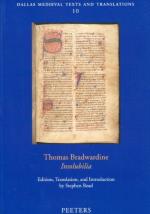|
This section contains 857 words (approx. 3 pages at 300 words per page) |

|
Thomas Bradwardine studied arts at Balliol College and theology at Merton College, Oxford. In September 1337, he was appointed chancellor of Saint Paul's in London. From 1346 to 1348, as a king's clerk, he enjoyed a prominent position in the household of Edward III. In June 1349 he was elected archbishop of Canterbury; soon afterwards, in October, he died of the Black Death.
Like many Mertonians, Bradwardine was a logician and a mathematician. He wrote a treatise De insolubilibus (an insolubile is a self-referential sentence, such as the "liar paradox"), a Geometria speculativa, and a treatise De continuo. In his Tractatus de proportionibus velocitatum in motibus (1328) he attempted to introduce mathematic functions into Aristotelician physics. His masterpiece, however, is a voluminous theological and philosophical work, De causa Dei contra Pelagium, divided into three books (1344). It originates from lectures he had given in Oxford and London and...
|
This section contains 857 words (approx. 3 pages at 300 words per page) |

|


